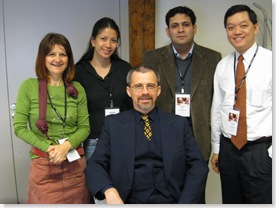Hanging With the APMs
Academic Program Managers (APMs) are the people at Microsoft responsible for implementing the Partners in Learning program I wrote about yesterday. We have about a hundred APMs around the world, working with local schools and education ministries on various types of education projects. APMs are the equivalent of the technical evangelists Microsoft has employed for decades (I used to be one), but instead of targeting software developers, these people focus on teachers and students.
I had the chance to hang out with some of our APMs at the education conference in Helsinki I am attending this week, and I have to say they are very interesting people.  Some of them are shown here. Vincent (on the left, and from Singapore) used to teach genetics; Suneet (India) used to work in rural computing; Darko (Croatia) was responsible for technology in his country's Ministry of Education; Michelle (Philippines) ran an academic institute, is the mother of 3, and is about to get her PhD as a side project; and Sanda ( Romania ) used to work in the film industry (and didn't know until today that she was listed in IMDB.)
Some of them are shown here. Vincent (on the left, and from Singapore) used to teach genetics; Suneet (India) used to work in rural computing; Darko (Croatia) was responsible for technology in his country's Ministry of Education; Michelle (Philippines) ran an academic institute, is the mother of 3, and is about to get her PhD as a side project; and Sanda ( Romania ) used to work in the film industry (and didn't know until today that she was listed in IMDB.)
One of the things the APMS discussed with me is the fact that some of Microsoft's least-known products are used extensively by teachers and students in schools throughout their countries. One example is Photo Story 3, a free download for Windows XP that makes it easy to combine photos, narration, and music into a multimedia report. Many of the projects demonstrated in the conference yesterday used this tool. Another example is Producer ("teachers love it"), a free download for Office 2003 that helps you make multimedia presentations.
South Africa provides some good examples of how the APMs impact their community. Reza Bardien, our APM there, described several projects where the team in South Africa takes a partnership-based approach with the Education Ministry, industry, and schools to get ITC curricula into the classroom. The idea is to do a pilot in a well-managed way with a series of partners, prove that it works, and then scale it in a manner so it is sustainable and repeatable. This is a multi-year process. One of these examples, involving the training of high school kids for jobs with a local mining company, was recently published as a case study. Reza also operates the "Africa Schools Technology Innovation Centre" (lovingly referred to as the "STIC") in Johannesburg. The STIC involves a consortia of 33 companies and government agencies and opened last April. It's mission is to provide a facility for ITC education research, training, workshops, and collaboration. (The STIC's manager, Angela Schaerer, wants to know when Live Writer will be available on phones. Don't know.)
several projects where the team in South Africa takes a partnership-based approach with the Education Ministry, industry, and schools to get ITC curricula into the classroom. The idea is to do a pilot in a well-managed way with a series of partners, prove that it works, and then scale it in a manner so it is sustainable and repeatable. This is a multi-year process. One of these examples, involving the training of high school kids for jobs with a local mining company, was recently published as a case study. Reza also operates the "Africa Schools Technology Innovation Centre" (lovingly referred to as the "STIC") in Johannesburg. The STIC involves a consortia of 33 companies and government agencies and opened last April. It's mission is to provide a facility for ITC education research, training, workshops, and collaboration. (The STIC's manager, Angela Schaerer, wants to know when Live Writer will be available on phones. Don't know.)
A common theme across all of the APMs I am meeting here is a sense of passion for what they do combined with a sense of humility about the approach Microsoft needs to take in education. "We cannot come in and make it sound like we have all the answers" they keep telling me. They also understand the comparison I am making between technical evangelism and education advocacy, but in a good humored way are not sure if they agree with it. "We deal with people, not machines!"